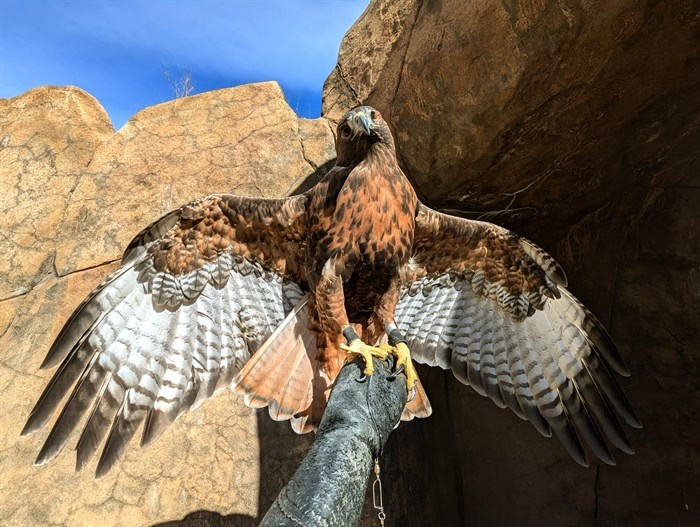
BC Wildlife Park falconer Jamie Pearce holds a raptor during an exercise flight in late summer.
Image Credit: SUBMITTED/ Jamie Pearce
November 19, 2024 - 6:00 AM
Reports of domestic and wild birds infected with the H5 avian flu virus have increased across BC this fall, but they haven't impacted the raptor rescue centres in Kamloops and the Okanagan yet.
Since the beginning the October, the virus has been detected on at least 22 poultry farms in BC, and in numerous wild birds and small mammals.
“In the past three years it’s come up often, we’ll see cases increase during migration but so far for us it has been a lot quieter this fall, I don’t think we’ve seen a case yet,” Tracy Reynolds with the BC Wildlife Park animal health centre in Kamloops said.
Avian influenza is caused by the type A influenza virus and can affect several species of food producing birds, pets and wild birds, and in very rare cases humans, according to the Canadian Food Inspection Agency.
Most avian influenza viruses are low pathogenic and don’t cause serious harm, while the highly pathogenic types H5 and H7 can cause severe illness and death in birds. There has been a global spread of avian viruses since 2022 resulting in the culling of more than 6.5 million birds in BC.
"It’s fairly recognizable to us, we’ll see lots of tremors and seizures and typically opaque corneas in affected birds,” Reynolds said. “Sometimes they can’t stand up, depending how far along they are.”
The public can bring carcasses of birds with potential for avian flu to the wildlife park and her team will double bag the birds, put them in the freezer and then ship them to the provincial Animal Health Centre in the Lower Mainland for testing.
“When the virus was prevalent in 2022, we shipped quite a few birds down,” Reynolds said. “The Lower Mainland gets more cases because migrating birds congregate there on the coast, and a lot of (avian influenza) is in waterfowl."
She said in 2022 the wildlife park had several infected Canada geese and a juvenile bald eagle that fed on a dead, infected goose.
There are ways of handling infected birds or pets that lower the risks of spreading the disease. At the animal health centre in Kamloops, if a bird with the virus is brought in it is euthanized and if it isn’t clear whether the case is avian flu the bird is put into isolation.
Employees are trained to recognize the illness and wear protective gear including gloves and disposable gowns when handling infected birds.
READ MORE: Meet the Kamloops man who cares for birds of prey, the creepiest of crawlies
The South Okanagan Rehabilitation Centre for Owls in Oliver takes in injured raptors including owls, hawks and eagles.
Founder Dale Belvedere said she has never had a confirmed case of avian flu at her centre.
“Honestly, with the avian flu, it’s been overblown after a reported incident of someone getting sick,” she said. “It stirred up the public and we’re getting a lot of calls, we’re trying to calm the public down.”
Anyone in the South Okanagan coming across a sick bird is asked not to touch it, but to contact Belvedere's centre for instructions and they will send a handler out.
“We ask the public not to handle birds anyway, not because of avian flu, because it’s not safe, you’re dealing with massive talons and beaks," she said.
READ MORE: Fostering rescued dogs inspires new book from West Kelowna author
Reynolds said if the public comes across a dead bird it is helpful to bag it up without directly touching it, put it in a second bag and get it to a landfill to remove the risk of a pet or other wildlife eating it and possibly spreading avian viruses.
The first domestically acquired human case of H5N1 avian influenza was confirmed in a media release issued by the Public Health Agency of Canada on Nov. 13.
“Today, the Public Health Agency of Canada's National Microbiology Laboratory (NML) in Winnipeg confirmed that the individual has avian influenza H5N1 and the genomic sequencing result indicates that the virus is related to the avian influenza H5N1 viruses from the ongoing outbreak in poultry in British Columbia,” the release read.
Human infection with avian influenza is rare but can happen after close contact with infected birds, other infected animals or environments contaminated with the virus.
READ MORE: iN PHOTOS: These edible mushrooms in Okanagan, Kamloops dissolve into ink
Suggested prevention measures by the provincial government include staying up to date on all immunizations, especially the flu vaccine, not touching sick or dead animals or their droppings, keep pets away from sick or dead animals and droppings, and report dead or sick birds or animals.
To report sick poultry of livestock, contact the Canadian Food Inspection Agency's Health Office, and if you suspect your pet is infected contact your veterinarian or call the BC Animal Health Centre at 1-800-661-9903.
To report sick wild birds, contact the BC Wild Bird Mortality Line at 1-866-431-2473, and for sick wild mammals, contact the BC Wildlife Health Program at 1-250-751-7246.
To contact a reporter for this story, email Shannon Ainslie or call 250-819-6089 or email the editor. You can also submit photos, videos or news tips to the newsroom and be entered to win a monthly prize draw.
We welcome your comments and opinions on our stories but play nice. We won't censor or delete comments unless they contain off-topic statements or links, unnecessary vulgarity, false facts, spam or obviously fake profiles. If you have any concerns about what you see in comments, email the editor in the link above. SUBSCRIBE to our awesome newsletter here.
News from © iNFOnews, 2024